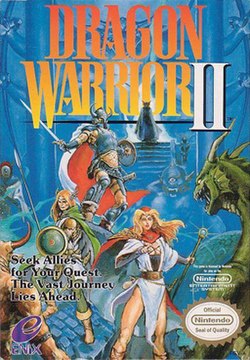Dragon Warrior II
| Dragon Quest II: Luminaries of the Legendary Line | |
|---|---|

Box art of the original North American NES release, then titled Dragon Warrior II
|
|
| Developer(s) | Chunsoft |
| Publisher(s) | Enix |
| Director(s) | Koichi Nakamura |
| Producer(s) | Yukinobu Chida |
| Designer(s) | Yuji Horii |
| Programmer(s) | Koichi Nakamura |
| Artist(s) | Akira Toriyama |
| Writer(s) | Yuji Horii |
| Composer(s) | Koichi Sugiyama |
| Series | Dragon Quest |
| Platform(s) | |
| Release | |
| Genre(s) | Role-playing |
| Mode(s) | Single-player |
| JP | NA | EU | |
|---|---|---|---|
| Famicom/NES | 1987 | 1990 | N/A |
| MSX | 1988 | N/A | N/A |
| MSX2 | 1988 | N/A | N/A |
| Super Famicom | 1993 | N/A | N/A |
| Game Boy Color | 1999 | 2000 | N/A |
| Cellphones | 2005 | N/A | N/A |
| Wii | 2011 | N/A | N/A |
| Android, iOS | 2014 | 2014 | |
| Aggregate score | |
|---|---|
| Aggregator | Score |
| GameRankings | GBC: 82% iOS: 78% |
| Review scores | |
| Publication | Score |
| Famitsu | FC: 38/40 SFC: 35/40 GBC: 30/40 |
| GameSpot | 9.6/10 |
| IGN | 8.0/10 |
| Nintendo Power | 8/10 |
| Award | |
|---|---|
| Publication | Award |
| RPGamer | Game Boy Color Award of the Year for 2000 |
Dragon Quest II: Luminaries of the Legendary Line is a role-playing video game (RPG) developed by Chunsoft and published by Enix (later merging with Square to become Square Enix) in 1987 for the Family Computer (or Famicom) as a part of the Dragon Quest series. Enix's U.S. subsidiary published the American version of Dragon Quest II for the Nintendo Entertainment System (or NES) in 1990. Dragon Quest II is set one hundred years after the events of the first game.
The game's story centers on the prince of Midenhall, who is ordered to stop an evil wizard named Hargon after Hargon destroys Moonbrooke Castle. On his adventure, he is accompanied by his two cousins, the prince of Cannock and the princess of Moonbrooke. Dragon Quest II greatly expands on the series formula from the first game by having a larger party, more areas to explore, multiple heroes and enemies in a battle, and a sailing ship.The game's successor, Dragon Quest III: And Into the Legend..., follows the ancestor of the main characters, the legendary hero Erdrick; and the three games are collectively called "Erdrick Saga Trilogy".
Planning began a month before the original Dragon Quest was released. One major goal was the development of a more exciting combat system, which was inspired by similar multi-character party systems such as the one found in Wizardry. The artwork that was used as the basis for the characters and monsters was painted by Akira Toriyama and then translated into pixel art. The game was hit with delays due to game balance, which were only fully corrected in the early sections of the game. This, combined with a staff that included students not familiar with the coding and debugging process, pushed back the release by a month. The developers also had many ideas that had to be discarded due to the technical limitations of the Famicom system, though some were later incorporated into subsequent remakes and the game's sequel, Dragon Quest III.
...
Wikipedia
